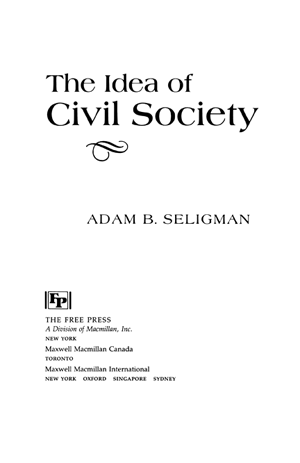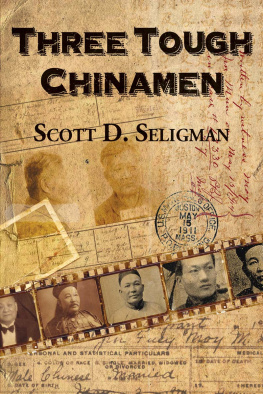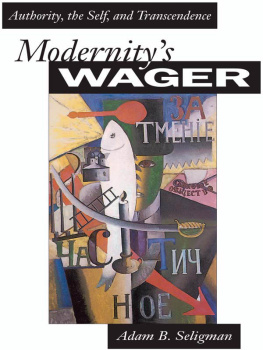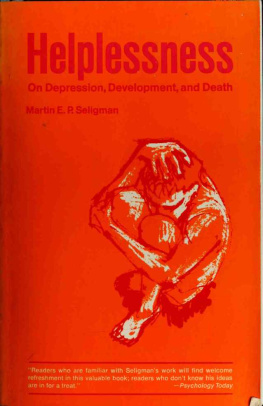Adam Seligman - Idea of Civil Society
Here you can read online Adam Seligman - Idea of Civil Society full text of the book (entire story) in english for free. Download pdf and epub, get meaning, cover and reviews about this ebook. year: 1992, publisher: The Free Press, genre: Religion. Description of the work, (preface) as well as reviews are available. Best literature library LitArk.com created for fans of good reading and offers a wide selection of genres:
Romance novel
Science fiction
Adventure
Detective
Science
History
Home and family
Prose
Art
Politics
Computer
Non-fiction
Religion
Business
Children
Humor
Choose a favorite category and find really read worthwhile books. Enjoy immersion in the world of imagination, feel the emotions of the characters or learn something new for yourself, make an fascinating discovery.

- Book:Idea of Civil Society
- Author:
- Publisher:The Free Press
- Genre:
- Year:1992
- Rating:4 / 5
- Favourites:Add to favourites
- Your mark:
- 80
- 1
- 2
- 3
- 4
- 5
Idea of Civil Society: summary, description and annotation
We offer to read an annotation, description, summary or preface (depends on what the author of the book "Idea of Civil Society" wrote himself). If you haven't found the necessary information about the book — write in the comments, we will try to find it.
Idea of Civil Society — read online for free the complete book (whole text) full work
Below is the text of the book, divided by pages. System saving the place of the last page read, allows you to conveniently read the book "Idea of Civil Society" online for free, without having to search again every time where you left off. Put a bookmark, and you can go to the page where you finished reading at any time.
Font size:
Interval:
Bookmark:
The Idea of Civil Society

Atheneum Books for Young Readers
An imprint of Simon & Schuster Childrens Publishing Division
1230 Avenue of the Americas, New York, New York 10020
www.SimonandSchuster.com
This book is a work of fiction. Any references to historical events, real people, or real locales are used fictitiously. Other names, characters, places, and incidents are products of the authors imagination, and any resemblance to actual events or locales or persons, living or dead, is entirely coincidental.
Copyright 1992 by Adam B. Seligman
All rights reserved. No part of this book may be reproduced or transmitted in any form or by any means, electronic or mechanical, including photocopying, recording, or by any information storage and retrieval system, without permission in writing from the Publisher.
The Free Press
A Division of Macmillan, Inc.
866 Third Avenue, New York, N.Y. 10022
Maxwell Macmillan Canada, Inc.
1200 Eglinton Avenue East
Suite 200
Don Mills, Ontario M3C 3N1
Macmillan, Inc. is part of the Maxwell Communication Group of Companies.
Printed in the United States of America
printing number
1 2 3 4 5 6 7 8 9 10
Library of Congress Cataloging-in-Publication Data
Seligman, A.
The idea of civil society/Adam B. Seligman.
p. cm.
Includes bibliographical references and index.
ISBN 0-02-928315-9
ISBN 13: 978-0-0292-8315-8
eISBN 13: 978-1-4391-0611-2
1. Civil society. I. Title.
JC336.S38 1992
306.2dc20 92-19591
CIP
Walter Benjamin Theses on the Philosophy of History
A Klee painting named Angelus Novus showes an angel looking as though he is about to move away from something he is fixedly contemplating. His eyes are staring, his mouth is open, his wings are spread. This is how one pictures the angel of history. His face is turned toward the past.

The idea of civil society has had a long history in the traditions of Western political thought. Its roots go back to Christian natural law speculation, while its early modern articulation in the Scottish Enlightenment has provided the inspiration to more contemporary arguments for its recovery. Resurrected in the 1970s, in the struggles between the Polish Workers Movement and the State appartus, the concept has, in recent years, been central to political debates in both Eastern and Western Europe as well as in the United States.
In this contemporary revival of the idea of civil society, the concept has come to mean different things to different people. Different thinkers have stressed different aspects of the concept as well as different historical sources and traditions as relevant to its contemporary usage. The resulting picture is one of great ambiguity and not a little confusion as the idea of civil society has come to mean one set of principles and practices to thinkers working in the liberal tradition of politics and another to their more conservative critics. Similarly, and perhaps even more importantly, the idea of civil society resonates very differently in the streets of Bucharest, Budapest, Vilna, or Prague than in Oxford, Princeton, Chicago, or Toronto.
Despite these differing theoretical perspectives and political agendas, what nevertheless makes the idea of civil society so attractive to so many social thinkers is its assumed synthesis of private and public good and of individual and social desiderata. The idea of civil society thus embodies for many an ethical ideal of the social order, one that, if not overcomes, at least harmonizes, the conflicting demands of individual interest and social good.
As it is this vision that, I believe, stands at the core of most contemporary attempts to resurrect the idea of civil society, it is this that will form the focus of the following analysis. By properly identifying both the historical and what may be termed philosophical conditions that made this vision possible in the past we may, I hope, arrive at a more coherent understanding of its relevance to contemporary political life, in both the West and the East.
In organizing this inquiry along these lines, the work of many thinkershowever important to the idea of civil society in generalhas not been dealt with. Notable perhaps in their absence are Bernard Constant, Lorenz Von Stein, and Antonio Gramsciall of whom made significant contributions to the idea of civil society in the nineteenth and beginning of the twentieth centuries. Constants comparison of liberty and civic virtue in ancient and modern societies, Von Steins attempt to unite legal science with state administration in a philosophical theory of Verwaltungslehre, and Gramscis analysis of the primacy of civil society in opposition to the State as locus for revolutionary praxis, all had direct bearing on the civil society debate. The absence of these and other thinkers from the present work is thus to be understood not in terms of their insignificance for the historical development of any idea of civil society but in terms of the volumes defining and rather circumscribed problematique focused on the ethical component of the idea of civil society.
In some cases, the concerns of these and other thinkers were deemed tangential to or repetitive of our main line of argument while others led us too far afield of the ethical component of civil society per se and more toward a theory of the State. This is true of the work of Lorenz Von Stein. Indeed, this last aspect of the civil society debate, centering more fully on the State/Civil Society dichotomy is much more salient among continental thinkers than Anglo-American ones. Though our own inquiry is oriented more to the tradition emanating from the Scottish Enlightenment than later continental thought (with a few important exceptions) the very reasons for this distinction are, it is hoped, made clear. Ultimately, the various traditions dealing with the idea of civil society are of different relative emphases, to be explained, in part, by the historical conditions pertaining in different countries and periods during the eighteenth, nineteenth and indeed twentieth centuries. My own belief is that the constitutive core of the civil society debate is however strikingly similar and adequately examined through the approach adopted herethe ultimate wisdom of which must be left with the reader to decide.
This book was written in Budapest. It was conceived in Los Angeles (at the gentle prodding of Peter Dougherty of The Free Press) and owes much (perhaps too much) to many years spent in Jerusalemin practical and theoretical engagement with the constitutive issues of citizenship and so of civil society. In developing my own ideas on the theme of civil society I have incurred immense debts to people in all three cities. To list all those whose thoughts, insights, and actions have contributed to my own ideas would be daunting. However, I would like to thank Marie Heller, Dnes Nmedi, and Gyrgy Csepeli at the Institute of Sociology, Etvs Lornd University, Budapest, for reading and commenting on various chapters and, together with members of the Sociology of Law Department, for sharing their thoughts and feelings during this period of transition with me.
Next pageFont size:
Interval:
Bookmark:
Similar books «Idea of Civil Society»
Look at similar books to Idea of Civil Society. We have selected literature similar in name and meaning in the hope of providing readers with more options to find new, interesting, not yet read works.
Discussion, reviews of the book Idea of Civil Society and just readers' own opinions. Leave your comments, write what you think about the work, its meaning or the main characters. Specify what exactly you liked and what you didn't like, and why you think so.






